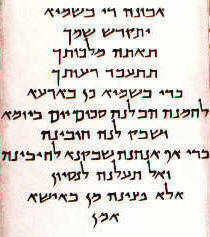The Lord's Prayer, like so many more of the precepts and discourses ascribed to Jesus, is borrowed. Dr. Hardwicke, of England, says: "The so-called 'Lord's Prayer' was learned by the Messiah as the 'Kadish' from the Talmud."
The Kadish, as translated by Christian scholar, Rev. John Gregorie, is as follows:
"Our Parent which art in heaven, be gracious to us, O Lord, our God; hallowed be thy name, and let the remembrance of thee be glorified in heaven above and in the earth here below. Let thy kingdom reign over us now and forever. The holy men of old said, Remit and forgive unto all men whatsoever they have done against me. And lead us not into temptation, but deliver us from the evil thing. For thine is the kingdom, and thou shalt reign in glory for ever and for evermore."
The eminent Swiss theologian, Dr. Wetstein, says: "It is a curious fact that the Lord's Prayer may be constructed almost verbatim out of the Talmud. The Sermon on the Mount is derived largely from the teachings of the Essenes, a Jewish sect to which Jesus is believed by many to have belonged."
How Did I Get To Here?Researcher Phil 1/12/10
I started out investigating the origins of "trespass vs. debts".
This led me to the following, which concludes that it is "debts, sins, and trespasses" depending on where one looks, what sect you are with, and which Gospel you read;
Though Matthew 6:12 uses the term debts, the older English versions of the Lord's Prayer uses the term trespasses, while ecumenical versions often use the term sins. The latter choice may be due to Luke 11:4, which uses the word sins, while the former may be due to Matthew 6:12 (immediately after the text of the prayer), where Jesus speaks of trespasses. As early as the third century, Origen of Alexandria used the word trespasses (παραπτώματα) in the prayer. Though the Latin form that was traditionally used in Western Europe has debita (debts), most English-speaking Christians (except Presbyterians and others of the Reformed tradition), use trespasses. The Established Presbyterian Church of Scotland as well as the Congregational denomination follow the version found in Matthew 6 in the Authorized Version (known also as the King James Version), which in the prayer uses the words "debts" and "debtors".
Monk
Original text in Greek
Πάτερ ἡμῶν ὁ ἐν τοῖς οὐρανοῖς·
ἁγιασθήτω τὸ ὄνομά σου·
ἐλθέτω ἡ βασιλεία σου·
γενηθήτω τὸ θέλημά σου, ὡς ἐν οὐρανῷ καὶ ἐπὶ τῆς γῆς·
τὸν ἄρτον ἡμῶν τὸν ἐπιούσιον δὸς ἡμῖν σήμερον·
καὶ ἄφες ἡμῖν τὰ ὀφειλήματα ἡμῶν,
ὡς καὶ ἡμεῖς ἀφίεμεν τοῖς ὀφειλέταις ἡμῶν·
καὶ μὴ εἰσενέγκῃς ἡμᾶς εἰς πειρασμόν,
ἀλλὰ ῥῦσαι ἡμᾶς ἀπὸ τοῦ πονηροῦ.
[Ὅτι σοῦ ἐστιν ἡ βασιλεία καὶ ἡ δύναμις καὶ ἡ δόξα εἰς τοὺς αἰῶνας. ἀμήν.]
( Yes, it really is all Greek to me.)
Scribe
Ancient Egyptian Scribe
Probably the best site I have found, so far, is HERE.
This site has the Lords prayer actually spoken in the original Aramaic.
I like it...it has good vibrations.
The Prayer to Our Father in the Original Aramaic

Abwûn O cosmic Birther, from whom the breath of life comes,
d'bwaschmâja who fills all realms of sound, light and vibration.
Nethkâdasch schmach May Your light be experienced in my utmost holiest.
Têtê malkuthach. Your Heavenly Domain approaches.
Nehwê tzevjânach aikâna d'bwaschmâja af b'arha. Let Your will come true in the universe (all that vibrates) just as on earth (that is material and dense).
Hawvlân lachma d'sûnkanân jaomâna. Give us wisdom (understanding, assistance) for our daily need,
Waschboklân chaubên wachtahên aikâna daf chnân schwoken l'chaijabên. detach the fetters of faults that bind us, (karma) like we let go the guilt of others.
Wela tachlân l'nesjuna Let us not be lost in superficial things (materialism, common temptations),
ela patzân min bischa. but let us be freed from that what keeps us off from our true purpose.
Metol dilachie malkutha wahaila wateschbuchta l'ahlâm almîn. From You comes the all-working will, the lively strength to act, the song that beautifies all and renews itself from age to age.
Amên. Sealed in trust, faith and truth. (I confirm with my entire being)
How Do I Pray?
I like the original Aramaic version of the Kadish,
but in the interest of "wisdom for my daily need",
I'll "go with the flow" and use "trespass".
Today's Relatively Appropriate Song;
Good Vibrations - Beach Boys
我的生活是伟大的。
我很幸运
Translation from Chinese
My Life Is Great.
I am blessed

No comments:
Post a Comment